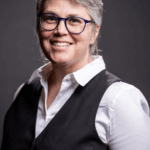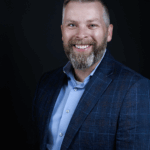
- Kim Kisner
- Business
- 05/27/2025
Fresh Coast Works with Small and Mid-Sized Enterprises to Navigate a Shifting Landscape

Fresh Coast Climate Solutions is a Michigan-based climate consultancy that aims to help organizations across sectors implement sustainable, equitable, and economically viable climate strategies. Founded on deep expertise in greenhouse gas inventories, carbon mitigation, ESG, water stewardship, and circular economy principles, the company provides technical support and strategic guidance to businesses and municipalities navigating the energy transition. Fresh Coast has partnered on projects ranging from municipal benchmarking in Flint to advanced battery development in collaboration with American Battery Solutions.

SBN Detroit interviewed Jenny Oorbeck and Josh Brugeman, co-founders of Fresh Coast Climate Solutions, to discuss the company’s current priorities, lessons from its recent projects, and how small and mid-sized businesses can build effective climate strategies in a fast-changing policy and economic landscape.
Q: What is the impetus behind Fresh Coast Climate Solutions?
Oorbeck: We launched Fresh Coast three years ago with a sense of urgency. The climate crisis felt personal and immediate, and we wanted to take the reins into our own hands. From the beginning, we focused on building a company culture grounded in bold, transformative action. That means not being afraid to push boundaries, not say no to pilot projects, and work only with partners who share our ambition and urgency. Our goal has always been impact at scale, not incrementalism.

Brugeman: We’re very deliberate about engaging in projects that move the needle. That includes deploying transformative technologies, piloting new programmatic approaches, and pursuing strategies that can meaningfully shift the trajectory of climate and sustainability efforts. We’re not interested in business-as-usual—we want to help organizations lead.
Q: What are the most common climate-related challenges businesses in Southeast Michigan are facing right now?
Oorbeck: We’re seeing a consistent challenge among small and mid-sized enterprises. Many are under pressure—from customers, employees, and supply chain partners—to demonstrate meaningful climate action. But they often lack the bandwidth, technical knowledge, or financial resources to respond effectively. New regulations, evolving standards, and growing stakeholder expectations can feel overwhelming. They need help making informed, strategic, decisions that advance both their sustainability and competitiveness.
Brugeman: For many of these companies, sustainability is becoming a prerequisite for doing business, especially if they’re part of larger supply chains. Increasingly, their clients are demanding emissions data, decarbonization strategies, and ESG transparency. The risk is real: Suppliers that don’t adapt could lose out on future contracts. That’s why we emphasize not only environmental stewardship, but also economic competitiveness and operational resilience – things like reducing energy costs or preparing for power disruptions and extreme weather events.
Q: Once businesses are ready to act, what barriers tend to prevent meaningful progress?
Oorbeck: The most common barriers are capacity and resources. In smaller organizations, sustainability is often an added responsibility for someone already juggling multiple roles. Without a dedicated team or financial backing, the work can stall. That’s why our Michigan Climate Wise Business Program—funded by the Erb Family Foundation—focuses specifically on helping these under-resourced companies move forward. We provide access to expert guidance so they can prioritize and implement practical solutions.
Brugeman: I’d also highlight two major gaps: technical expertise and access to capital. Many businesses know sustainability is important, but they don’t know where to start. That’s where engaging external experts can make a difference. We encourage companies to look for “no-regrets” projects—efforts that cut emissions, save money, improve efficiency, and position them for future success.
Q: Are there misconceptions you regularly encounter when it comes to emissions, ESG, or water stewardship?
Brugeman: One of the biggest misconceptions is around timelines. Many leaders focus solely on short-term paybacks, but climate action is a long game. Sustainability isn’t just a “nice to have”—in larger organizations, it’s already embedded into operations, tied to financial incentives, and closely monitored at the executive level. Smaller companies don’t always realize how deeply integrated these issues have become, and that disconnect can be costly.
Oorbeck: Agreed. Another misconception is that the pressure to act will fade, or that a few small gestures are enough. The reality is that some companies risk being dropped as suppliers if they can’t demonstrate credible sustainability progress. We need to move the conversation beyond quarterly goals and toward long-term impact. This is the defining business challenge of our time.
Q: How does Michigan’s regional identity shape the way companies need to approach sustainability?
Brugeman: Michigan has a unique responsibility and opportunity. We sit at the center of the largest freshwater system on the planet—yet we undervalue and underprotect this critical resource. Water stewardship should be a defining focus for our region.
We also have deep roots in heavy manufacturing, which has been the economic backbone of the state. As the global economy shifts toward decarbonization, Michigan is positioned to lead—but only if we commit to building a cleaner, more sustainable industrial base. We’ve excelled at making things. Now we need to excel at making them responsibly.
Q: You’ve worked with municipal governments on decarbonization strategies. What can businesses learn from those efforts?
Oorbeck: I started my career in the public sector, and at times cities have led the way in sustainability, especially when support at the state or federal level has wavered. Cities began developing climate action plans more than two decades ago. Businesses can learn from those experiences: how to build internal teams, engage stakeholders, and set meaningful targets. At the same time, municipalities can learn from the agility of the private sector, especially in deploying solutions quickly.
Brugeman: One thing the public sector does well is plan for the long term. That mindset is essential for climate action. Conversely, the private sector often moves faster and embraces innovation more readily. If each sector borrows from the other, we can accelerate progress.
Q: What recent projects are you especially proud of and what lessons might they offer to other Michigan businesses?
Brugeman: One is our Michigan Climate Wise Business Program. In partnership with Centrepolis Accelerator and supported by the Erb Family Foundation, we provide sustainability and climate services to small and mid-sized businesses that lack the internal capacity to act on their own. We’ve worked with a wide range of organizations—from manufacturers seeking greenhouse gas data to startups launching new low-carbon technologies. The program will serve 30 businesses over three years, and we’ve seen strong results in the first two and a half years of running the program.
Oorbeck: Another example is the City of Sterling Heights’ first climate action plan. In partnership with Giffels Webster, we helped the city integrate climate resilience and adaptation into its broader planning efforts, aiming for net zero by 2050. It’s a model for how municipal operations and community-wide strategies can work together to protect residents and prepare for future challenges.
Be sure to subscribe to our newsletter for regular updates on sustainable business practices in and around Detroit.
Kim Kisner
- All
- Business
- Community
- Education
- Events

Unique Monique Scented Candles, a Detroit-based business founded by Monique Bounds., aims to produce candles and household products with clean ingredients and local supply chains. What began as a personal hobby during college has evolved into a full-time venture producing coconut oil and soy-based candles made with essential oils and locally sourced materials. SBN Detroit interviewed Bounds about launching a sustainable product line, sourcing challenges in Michigan, and...

Eastern Market Partnership, in collaboration with the City of Detroit’s Office of Sustainability Urban Agriculture Division, has announced $240,000 in grant funding to support Detroit-based farmers and farmer collectives. The grants will advance food access, climate education, sustainable land use, and economic opportunity, with priority given to Black- and Indigenous-led farms, youth-led initiatives, and projects rooted in historically disinvested neighborhoods. The recipients – ranging from cooperatives and community...

Citizen Robotics is a Detroit-based nonprofit that advances the use of robotics and digital manufacturing in residential construction, focusing on improving productivity, sustainability, and long-term affordability. Best known for its early work in 3D-printed housing, it explores how alternative construction methods and new financial models can reduce material waste, lower lifetime operating costs, and enhance the resilience of homes. SBN Detroit interviewed Tom Woodman, founder and president of...







